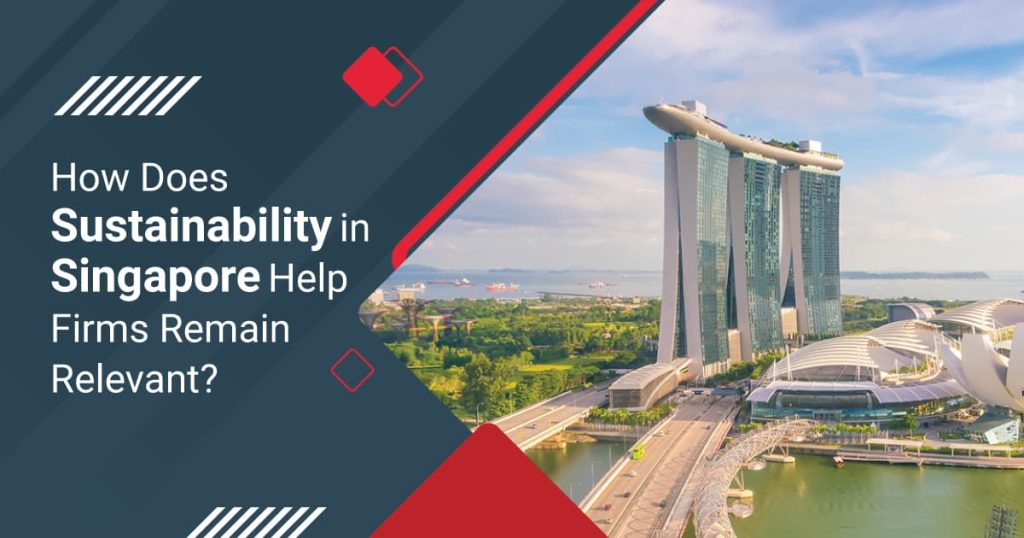 There is no way around it – Singapore is a nation of consumers. We are in a constant cycle of buying products and services that impact our environment in significant ways.
But as sustainability awareness becomes more apparent across all parts of the value chain, Singapore’s organisations realise the importance of sustainability and how it can help them remain relevant.
There are some reasons that may drive the adoption of sustainable practices for these companies:
There is no way around it – Singapore is a nation of consumers. We are in a constant cycle of buying products and services that impact our environment in significant ways.
But as sustainability awareness becomes more apparent across all parts of the value chain, Singapore’s organisations realise the importance of sustainability and how it can help them remain relevant.
There are some reasons that may drive the adoption of sustainable practices for these companies:
- The realisation that consumers are slowly starting to desire more environmentally conscious products and services
- The public relations advantages of being associated with the cause of sustainability
- The intention to help create a sustainable future in the face of worsening climate change for future generations
Support for Sustainable Development in Singapore
If nothing else, Singaporean companies can assume their government’s backing in their sustainability journeys. For one, it has made the significance of sustainability moves clear by establishing the Singapore Green Plan 2030 as part of its actions to build a sustainable and resilient future. This whole-of-nation movement aims to advance Singapore’s national agenda, with ambitious goals such as:- Increasing solar energy deployment fourfold by 2025
- Positioning Singapore as Asia’s carbon services hub
- Nurturing a pool of local organisations to seize sustainability opportunities
Why Does Sustainability in Singapore Make Sense?
Investment-wise, the Monetary Authority of Singapore (MAS) predicts that there will be US$200 billion per year of green investments in ASEAN countries by 2030. Add to this that environmental, social, and governance (ESG) focused assets are projected to grow to US$50 trillion by 2025, and it makes a lot of sense to invest in sustainability. Let us look at how sustainability can help organisations in Singapore remain relevant and provide them with ways to save costs and increase profits and market share.Save Cost and Increase Resilience
By reducing their carbon footprint, Singaporean firms can save electricity, water and waste management costs. This is especially true for companies that rely heavily on energy in their production processes. Organisations that use renewable energy sources such as solar energy and wind power can also benefit from government subsidies. For example, Containers Printers, a local packaging solutions company supplying, set its own targets for carbon emissions back in 2018. They created an in-house energy management team, which retrofitted lighting to more efficient LED lighting, deployed rooftop solar panels, and replaced equipment with more energy-efficient options. The change to solar panels alone has provided 1,800MWh (approx S$535,000) annually while reducing their carbon emissions by 800 metric tonnes annually. Related Read: Relooking Sustainability After COVID-19 »Philanthropy and Relationship Building
When companies like Google give a S$1 million grant to Mandai Nature to help find sustainability solutions, it is a clear sign that sustainability investments can help open up pathways for philanthropic activities and strengthen ties between companies and local communities. Google will use the funding to develop open-source mapping tools to identify locations in Singapore that can host biodiversity and also help reduce carbon emissions. They will also educate the best practices for nature-based solutions that will encourage ESG-based innovation and investment. This sort of strategic move can help companies build relationships with local communities and generate goodwill that will help them remain relevant in the minds of stakeholders. Related Read: Why Sustainability Reporting is Important for Businesses in SingaporeNew Product and Service Categories to Attract Consumers
Organisations that invest in sustainability can also benefit from increased efficiency and be better prepared to develop new products, services, and business models. For example, Singapore Airlines has undertaken several initiatives to produce net-zero carbon emissions by 2050. Current initiatives include:- Installing solar panels on all of its office buildings in Singapore, generating renewable energy that provides up to 18% of its required electricity.
- Using blended Sustainable Aviation Fuel (SAF) at Changi Airport via the airport’s fuel hydrant system, which is expected to cut carbon dioxide emissions by 2,500 tonnes.
- Offering green package flights from San Francisco all the way to Singapore! These include sustainable aviation fuels, fuel-efficient aircraft, and improved air traffic management.
Seizing Opportunities in Government Funding
As mentioned earlier, MAS is very much aware of the potential of the green sector. It has allocated S$180 million to its Enterprise Sustainability Programme, which aims to help Singapore organisations reach their potential within a new green economy. The 4-year initiative backed by Enterprise Singapore (ESG) is set to invest S$180 million. This will help over 6,000 businesses with financing, workshops, and other support. These initiatives are a great way to seize opportunities and remain competitive in the market. Companies that wish to assess and improve their green credentials and capabilities can use a new tool developed by the Agency for Science, Technology and Research (A*Star) and partners called Green Compass. The 4-step model helps businesses take control of their carbon emissions, energy and water use, and waste, and develop a plan to make their operations more sustainable.Sustainability is a Necessity for Long-Term Competitiveness
In conclusion, sustainability is no longer an option but a necessity for companies that want to remain competitive in the years to come. By investing in renewable energy sources, philanthropy initiatives and new product categories, organisations can utilise government funding and strengthen their relationships with local communities. These investments will certainly position Singapore companies at the forefront of a new green economy. Related Read: Sustainability in Singapore: How it Spurs Sustainable Innovation »FAQs
How important is sustainability for companies?
- A sustainability strategy can enable a business to make long-term investments as they venture into a high-growth market. It can also provide a competitive edge and add brand value.
What are some examples of business sustainability?
Some examples of sustainable business practices are:
- Reducing carbon footprint
- Reducing the use of resources like water and electricity
- Waste management
How can a business adopt sustainable practices?
- You can engage InCorp’s environmental, social, and governance (ESG) experts to get your business started on your sustainability journey.



